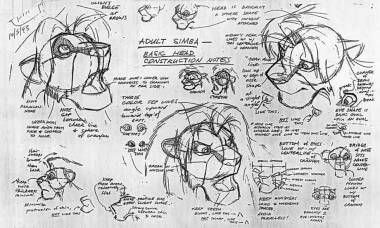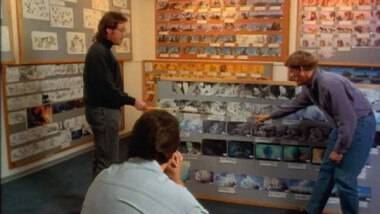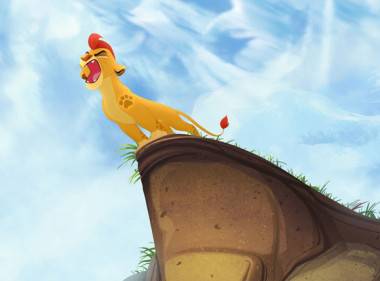The Twenty Year Reign of The Lion King.
We celebrate the 20th anniversary of Disney’s The Lion King with a retrospective history of one of the most significant feature animated films in Disney’s up and down history. Why is it such a great film? What’s it’s legacy? and what significance does it hold alongside the other films in Disney’s 52+ animated feature catalogue? In this article I attempt to answer these questions, without many spoilers; just in case you have not seen it sometime in the last 20 years.
Released after the success of Beauty and the Beast and Aladdin, The Lion King is considered the pinnacle of Disney’s 90’s renaissance. As Disney’s 32nd animated feature, it became the highest grossing Disney animated movie of all time until recently (Frozen knocked it off the top spot), it won two Academy awards, spawned two direct to video sequels, two spin-off television series, video games, mountains of merchandise and an award winning west end musical! The film is the first Disney feature not to be based on a single source material, said to be an amalgamation of Shakespeare’s Hamlet and the biblical story of Moses with most animation fans pointing to the similarity between it and anime TV series Kimba the White Lion. The Lion King also sees the first on screen death of a major character in any Disney feature animated film; Disney had taken a risk in portraying the heart wrenching scene, which has since become iconic. Including the death displayed Disney’s new maturity – a different approach from the days of the “they’re not really dead, only sleeping”.
The Lion King’s ‘official’ birth is said to have spawned from a conversation about a documentary of African Lions, being discussed on a Disney business trip; whilst the ‘Disney motion picture division’ was promoting Oliver and Company. Jeffrey Katzenberg, the head of the motion picture division at the time, jumped on the idea of developing a treatment involving a coming of age story, set in the African wild.
The idea was developed first by Thomas Disch (Brave little Toaster) and then Linda Woolverton (Screenplay: Beauty and the Beast) who would receive the writing credit with Irene Mecchi and Jonathan Roberts. Roger Allers (Head of story Beauty and the Beast) became attached to the project as Director, and Rob Minkoff (character animator The Little Mermaid) would also come to co-direct adding an animators perspective. During the development process the plot had changed dramatically twice, including a version where Scar was the leader of an army of baboons, the film we have today was quickly taking shape.
The focus for Disney Animation at the time was the development for Pocahontas, which was seen as the certain success of the two. Animation demi-god Glen Keane was deeply involved with Pocahontas as supervising animator as part of the story team and visual development. Other big animators, Mike Gabriel and Eric Goldberg, became the directors. Pocahontas could be seen as the animator’s production, whilst The Lion King was left with predominantly story people and unknowns at the helm of the development. To help bolster The Lion King, the team received veteran Don Hahn (Beauty and the Beast, Who Framed Roger Rabbit) to produce and Brenda Chapman (The Little Mermaid, Beauty and the Beast) as head of story. The teams were never at odds with each other, but in hindsight both productions where top heavy in one area; one lacked strength in the story and the other in animation, although you would hardly notice it unless you really analysed them.
The Lion King also saw the departure of Alan Menken to work on Pocahontas. Menkin along with his late writing partner Howard Ashman produced the hit songs for The Little Mermaid, Beauty and the Beast and Aladdin. Ashman sadly passed away during the production of Beauty and the Beast. Menkin, with material left by Ashman, worked with Tim Rice to complete the songs for Aladdin. Rice was given The Lion King on the condition that he would find a new writing partner, first offering the partnership to ABBA and then to Elton John, who accepted. Together they created the memorable songs ‘Circle of Life’ and ‘I Just Can’t Wait to Be King’. The duo won an Academy award for ‘Can You Feel The Love Tonight’ which Elton John sang himself. John and Rice looked for inspiration from The Jungle Book, creating original pop-like songs which both parents and children could get hooked on. The Lion King was the first Disney Animated film to attach a big chart musician to create music for the feature, something they would continue to do again with Phil Collins (Tarzan, Brother Bear) and Sting (Emperors New Groove). The Lion Kings musical score was created by Hans Zimmerman, his first score for an animated feature, for which he also won an Academy award.
After the success of Robin Williams as the Genie, Disney hired more celebrities to voice characters. Whoopi Goldberg, Jeremy Irons, James Earl Jones and Matthew Broderick all added extra appeal to the finished production of The Lion King’s epic dialogue and story arc. The Lion King signalled the first animated film to have so many recognisable voices in the actors billing, something Disney would continue to try and emulate for a few years, before animated features really began to rely on billing to get people to see films.
Having used 3D (CG) animation modelling for the cave of wonders in Aladdin, 3D software was used to create thousands of running Wildebeest rather than facing the complexity of animating each one, saving money and time. The 3D elements also added a nice story feature to the massive press release of the film, capturing people’s imaginations of computer animation before Toy Story was released in 1995. In 1994 3D animation was still being viewed as an aid to traditional animation, rather than being the whole process for Disney, in a few short years this would change forever.
Frank Wells, President of the Walt Disney Company from 1984 passed away in a helicopter accident in April 1994, two months before The Lion Kings theatrical release, the film is dedicated to his memory. The sudden departure of Wells opened a rift between CEO Michael Eisner and Jeffrey Katzenberg. Eisner refused to promote Katzenberg to the position of President, although people believed the success of Disney’s animation resurgence was due to Katzenberg’s unique management style. Katzenberg left soon after The Lion Kings release, he sued Disney for millions (which he won) in residuals and created DreamWorks SKG with Steven Speilberg and David Geffen.
Once tested on audiences, Disney management realised The Lion King was to be a bigger hit then they had first hoped, the company was immensely excited about the film they created, seeing it as a spiritual awakening. However, The Lion King’s wasn’t an accidental success or the least bit ‘humble’ in its making. It was the culmination of years of previous experience, from the low point of The Black Caldron to the Best Picture Oscar nomination of The Beauty and the Beast, finally paying off. Artists had gotten better, story people had gotten better and Disney had found and secured its audience again.
The Lion King continues to make money for Disney since its release on June 15th 1994. 2012 saw the release of a 3D converted copy in theatres and Blu-ray. Recently Walt Disney announced a new Lion King spin-off, The Lions Guard, a made for TV movie and subsequent series for Disney Junior, Planned for early 2016. The plot follows Simba and Nala’s son, forming a group of friends to protect the pride lands.
Today, aside from being a brilliant film The Lion King creates heart warming nostalgia; It causes audiences to think back to the first time they watched certain scenes, the tears, laughter or anger we all experienced and the fear you felt for the characters. The Lion King also impacted fan’s lives with merchandise and extra media. I still have an old Lion king lunchbox and I know others whom have any number of items of merchandise, still hidden around their home. Recently listening back to the soundtrack I realised after 20 years it’s still pretty good.
It is questionable whether Disney has lived up to the legacy that The Lion King created in the years following the film in terms of quality, however it had reawakened Walt Disney’s dream of high quality family entertainment, which people would keep returning to because trusting the name. So, even now after 20 years I acknowledge that this film was one of the biggest events in my childhood, however I could not have known at the age of seven, that The Lion King had secured its place in the history of animated feature films.





